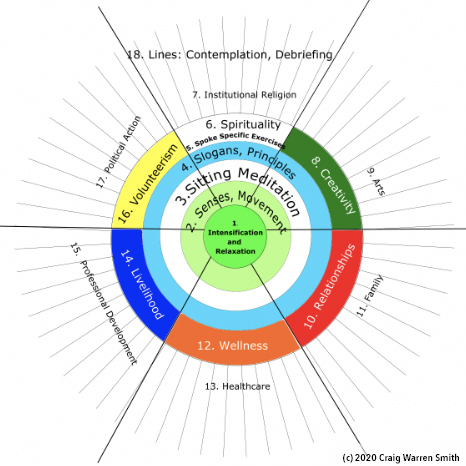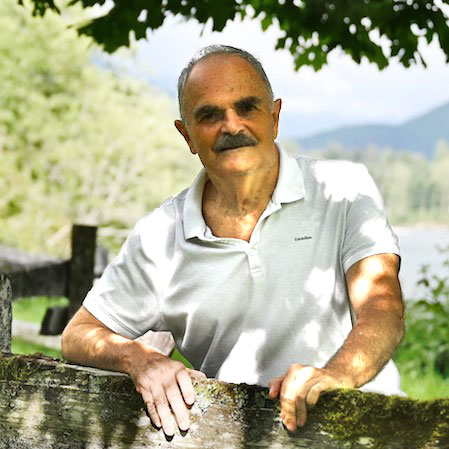Mudra Presentation & Practice Series, Talk 1
with Dr. Craig Warren Smith and Suzann Duquette
January 23

Talk 1: What is Mudra?
Time: 9-11 a.m. Eastern
Price: $50 per Talk
About the series
The Mudra Journey: Lifestyle transformation in the new normal of COVID
In this five-week class series, 50 years after Chögyam Trungpa first presented Mudra Space Awareness, it will be presented for the first time as a complete upaya — a 24/7 practice designed especially for the moment we are in today. No longer confined to theater training, this practice, succinctly presented in the above diagram, is designed to promote leadership in the moment of groundlessness that arises in the wake of COVID.
Presentations and Practice
Each session in the series has two parts, a framework presentation offered by Professor Craig Warren Smith and mind/body and perception exercises, Mudra practice, led by Acharya Suzann Duquette and supported by other Mudra teachers. Exercises will relate to the theme of each of the presentations.
“Chaos should be regarded as extremely good news ...Chaos is the great space of emptiness that occurs before genesis. ... This space provides an opportunity to reconnect with what lies under the chaos and negativity — inherent awakened nature. Another way chaos is good news is that when things seem very bad, there is a big opportunity for something good to take place.” — Chögyam Trungpa Rinpoche
Register for Lecture 1 and/or 2 individually.
Lectures 3 - 5 must be taken as a package.
About Talk One: What is Mudra?
The core of this practice is tied to a specific meaning of Mudra. It is a gesture that flips perception from dual to nondual, in which separations dissolve. What does doing Mudra feel like? What does it mean to dwell in nondual perception? How does this then evolve into a form of action and ultimately lifestyle transformation? What is the overview of the full Mudra path, as indicated in the diagram? This diagram then becomes the single reference point for the five-week class.
Schedule
The online Zoom room for this presentation and practice session will open at 8:45 a.m. on Saturday, Jan 23, for you to sign-in, check your connection, and do any necessary trouble-shooting of technical issues. The program begins at 9 a.m. with a talk, followed by Mudra practice. The program ends around 11 a.m. All times are Eastern time zone.
Other Talks in this Series
Registration Deadline
Because of the nature and logistics of online programming — including ensuring that you have the proper links, materials and schedules — the deadline to register and be paid in full for this program is 48 hours before it begins. The price below includes a $10 per person teaching gift for Dr. Smith, who is responsible for holding and developing the full scope of the Mudra Institute.
-
Please note that some of the automated text regarding pricing lists the inclusion of accommodations and/or meals. This is not applicable to ONLINE classes
Prerequisites:
In order to attend this talk, participants must have taken either an in-person Mudra Space Awareness weekend or retreat to attend this series. However, the teachers are willing to make exceptions. If you believe an exception should be made in your case, please contact: jtbuck@karmecholing.org.
This talk, or Talk 2, is a prerequisite for Talks 3-5.
Pricing
Karmê Chöling values its commitment to making programs affordable and available to all who wish to study with us.
To support this commitment we provide two program price options.
TUITION: $40
This is the actual price of the program.
GENEROSITY PRICE: $50
We offer this generosity price to those who can afford to pay a little more. Your generosity makes it possible for Karmê Chöling to offer it's programs at a reasonable price.
Payment Policies:
Karmê Chöling has updated its payment policies. The new policies apply to all programs that start after January 1, 2019. Please read the payment policies before proceeding with registration.
Financial Aid:
Karmê Chöling offers full-time student discounts, scholarships and other financial aid.
Program Credit:
If using existing program credit to pay for a program, you must pre-register for this program at least two weeks prior to the program start date by calling the front desk (802-633-2384 x3000). Program credit may not be used to pay for housing or practice materials and may not be used on or after arrival day.
Online registration is not currently open.
Teachers
About Dr. Craig Warren Smith

Professor Craig Warren Smith, became the first teacher of Mudra Space Awareness after receiving transmissions of the practice directly from CTR in the early 1970s. After introducing the practice to Naropa in 1974, he then began teaching the program in dozens of Shambhala Centers, culminating in the Dathun with Mudra at Karme Choling, co-taught with Suzann Duquette. At that time, under his leadership, the three-part (Vision-Method, Application) structure of Mudra began to emerged. After graduating with honors at Stanford University, he became Harvard Professor of Technology Policy at the Kennedy School of Government. He later became an advisor to world leaders regarding the regulation of the internet. Currently, he advises the Republic of Indonesia on implementation of an ethics based model, called Meaningful Broadband. (
https://en.wikipedia.org/wiki/Craig_Warren_Smith). In recent years his approach to digital dynamics merged with Mudra, e.g. by using Muda visual exercises for content creation in virtual reality. A leader of the gay rights movement in the 1970s, he introduced the topic of “queer dharma” to Shambhala Centers in the 1990s.

About Suzann Duquette
Suzann Duquette has been a student in Shambhala for 45 years, and has served as a leader in the governing, teaching, and protection service areas of the community. Previous co-director and director of Karmê Chöling, Suzann is now the center’s Senior Teacher in residence. Suzann has taught widely on the Art of War, is an instructor of Daoist-Qigong in the lineage of Dr. Eva Wong, and is a senior teacher of Mudra Space Awareness, as presented by Chögyam Trungpa, Rinpoche. Through body disciplines and awareness practices, she emphasizes embodiment in all of her teaching.





 (802) 633-2384
(802) 633-2384